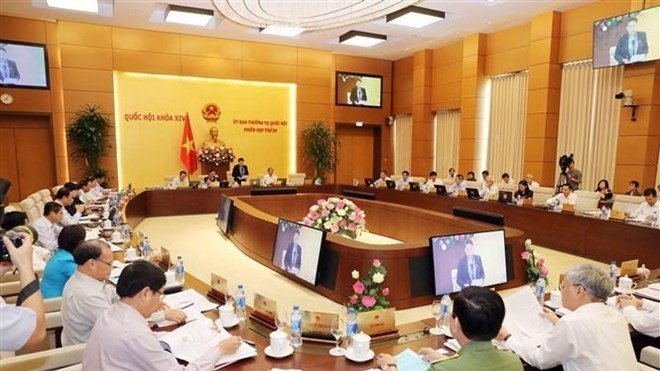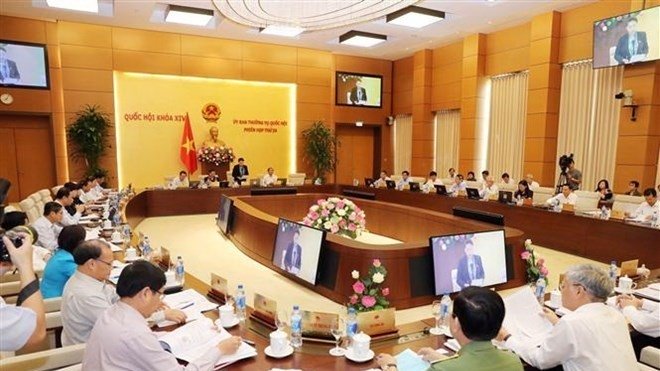



The National Assembly Standing Committee opens its 28th session on October 15. (Photo: VNA).
Opening the session, NA Chairwoman, Nguyen Thi Kim Ngan, said that high on the working agenda are reports to be submitted to the NA, which assess the socio-economic and budget performance in 2018, socio-economic development plans and State budget estimates for 2019, the mid-term outcomes of the five-year plans on socio-economic development, economic restructuring, national target programmes, mid-term public investment plans and the national financial programme.
The committee will also review three years of implementing support policies for socio-economic development in mountainous and ethnic minority areas, and look into the remaining of the 2017 State budget and adjustment of the investment plan using Government bonds for 2018.
Among the documents to be tabled for discussion, there are also reports summing up voters’ feedback and petitions sent to the NA’s 6th session, and the supervision of the settlement of voters’ petitions sent to the NA during 2018.
The committee is scheduled to consider the approval of the Comprehensive and Progressive Agreement for the Trans-Pacific Partnership (CPTPP) and related documents, and examine the implementation of the NA’s resolution on piloting electronic visas for foreigners.
Personnel matters are another important task for the NA Standing Committee at this session.
Following the opening ceremony, the committee listened to mid-term reports on the implementation of the 2016-2020 socio-economic development plan, the NA’s Resolution 24/2016/QH14 on restructuring the economy in 2016-2020 period, and the NA’s Resolution 100/2015/QH13 on investment in national target programmes during 2016-2020, alongside reports on socio-economic performance in 2018, plans for 2019 and the outcomes of three years implementing the support policies for socio-economic development in mountainous and ethnic minority areas.
The Government’s report, presented by Minister of Planning and Investment, Nguyen Chi Dung, said total social investment in 2018 reached VND 1,890 trillion (around US$ 81 billion), equivalent to 34 percent of the country’s GDP. The report noted the increasing trend in investment by the private sector, which accounted for 42.4 percent of the total investment in 2018, compared to 40.6 percent in 2017 and 30.8 percent in 2016. The rate has surpassed the 2018 target set by the National Assembly at 34 percent.
Explaining the rise, the report said that effective measures taken by the Government and the Prime Minister in promoting administrative reform and improving the business and investment environment have boosted the establishment of new enterprises and the development of cooperatives.
Specifically, the first nine months of this year saw the formation of 96,621 new enterprises with a total registered capital of VND 963.4 trillion, up 2.8 percent in number and 6.7 percent in capital compared to the same period in 2017. In addition, 22,987 enterprises resumed operation. Taking into account the additional capital of existing enterprises, a total of VND 2,840 trillion was pumped into the economy in the period.
Speaking on behalf of the NA’s Committee on Economic Affairs, Chairman Vu Hong Thanh agreed that institutions for the private sector have gradually been completed with the promulgation of many legal documents and policies. However, he noted that there remain several bottlenecks in the implementation of support policies targeting the private sector, especially resource shortages and barriers in the form of procedures.
According to Chairman Thanh, it is difficult to reach the goal of having 1 million enterprises by 2020, given the existing hindrances and the high number of business dissolution and bankruptcy in the first nine months of this year.
The 28th session of the NA Standing Committee will last until October 17.
Source: NDO